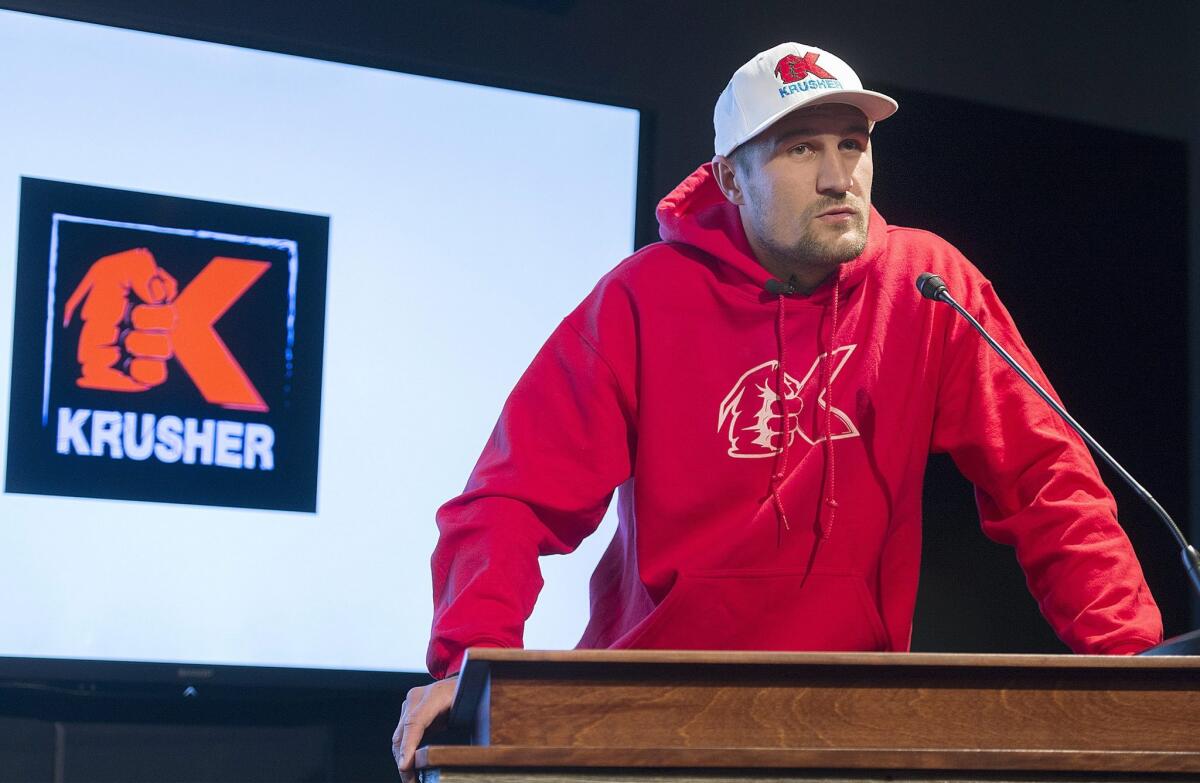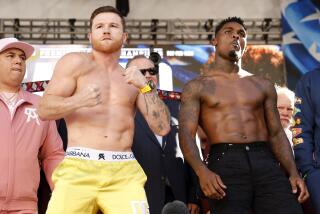Sergey Kovalev-Adonis Stevenson fight becoming casualty of boxing business

Sergey Kovalev speaks during a news conference in Montreal on Nov. 30.
- Share via
A deal to make a light-heavyweight unification fight between Russia’s Sergey Kovalev and Canada’s Adonis Stevenson is crumbling, and questions as to why are mounting.
Kovalev’s promoter, Kathy Duva, says Stevenson and his powerful manager, Al Haymon, have ruined it by insisting that Showtime join Kovalev’s network, HBO, in a joint pay-per-view.
Kovalev’s manager, Egis Klimas, blames Haymon for placing his allegiance to his boxing company, Premier Boxing Champions, and Showtime over that of Stevenson’s best financial interests.
And Showtime Vice President Stephen Espinoza doesn’t understand why solutions that seem possible aren’t being considered.
For now, Duva said, the favored three-belt champion Kovalev (28-0-1, 25 knockouts) will fight a Saturday rematch against Jean Pascal in Montreal, and then pursue a stay-busy June fight in Moscow before a November showdown with former super-middleweight champion Andre Ward.
Demanding Showtime involvement “is the kind of term you put in a deal when you don’t want to make it,” Duva said. “We went through three months of negotiations [with Stevenson’s Canadian promoter, Yvon Michel] that it turns out were in bad faith.
“Yvon and I can agree on everything, and then it goes to Al and Adonis. And either Al is putting his interests ahead of Adonis’ or Adonis doesn’t want the fight. I have to come to the conclusion Adonis doesn’t want the fight. If he did, he’d stand up to his manager and tell him to make the fight. We had a site [MGM Grand in Las Vegas], a date, everything in place, a 50/50 split. … They walked away from that deal. They know it’s not coming back.”
The past two joint pay-per-view fights were both blockbusters: Floyd Mayweather Jr.-Manny Pacquiao in May and Lennox Lewis-Mike Tyson in 2002.
Kovalev, 32, and Stevenson, 38, are still building audiences, but Duva estimates the bout would’ve generated more than $10 million in gate, pay-per-view and other revenue.
“Two power punchers in a fight where they clearly don’t like each other. … It would’ve been a tremendous promotion,” Duva said. “So I’ve come to believe this is just posturing to use Sergey’s name to get publicity” for Stevenson (27-1, 22 KOs) to fight later this year, possibly against Andrzej Fonfara.
Klimas said in light of two lawsuits against Haymon from rival promoters Bob Arum and Oscar De La Hoya over claims he has violated the federal Ali Act that forbids a manager from functioning as a promoter, the failure of this negotiation should shed more light on why the separation needs to exist.
Haymon counts Stevenson as a Premier Boxing Champions fighter, and the company has an established relationship with Showtime and its parent company, CBS, which also airs Haymon/PBC bouts, including a February card in Anaheim headlined by Leo Santa Cruz and a March 12 welterweight title fight between Keith Thurman and Shawn Porter on CBS prime time.
“Now, everyone knows who calls the shots,” Klimas said. “We just went through the proof. … We’re talking $12 million to $14 million to split. Do you think [Haymon] can get Stevenson that kind of money anywhere else? This was a guarantee. … Stevenson last fought on Showtime in 2014, so what kind of Showtime fighter is he?
“Stevenson could right now bring a lawsuit because [Haymon] is not protecting the fighter. He is in it for his business interests, watching out for the network to get paid rather than his fighter.”
Yet some in the boxing industry ask why HBO is reluctant to entertain bidding against Showtime for the highest license fee (instead of designating the bout a pay-per-view).
“Both networks want the fight to happen. Each network has an attachment to their specific guy. We should let both networks bid on it; the highest bidder gets the fight,” Showtime’s Espinoza said.
“Showtime’s willing to take that risk. It’s in the best interests of the fighters and promoters. It maximizes the TV license money. Failing that, an easy way to solve it is a joint pay-per-view. There are multiple ways to solve this problem. It’s not that complicated.
“It’s the right fight for both guys, for the fans and the networks. Those in the sport should be doing all we can to make it happen.”
More to Read
Go beyond the scoreboard
Get the latest on L.A.'s teams in the daily Sports Report newsletter.
You may occasionally receive promotional content from the Los Angeles Times.











